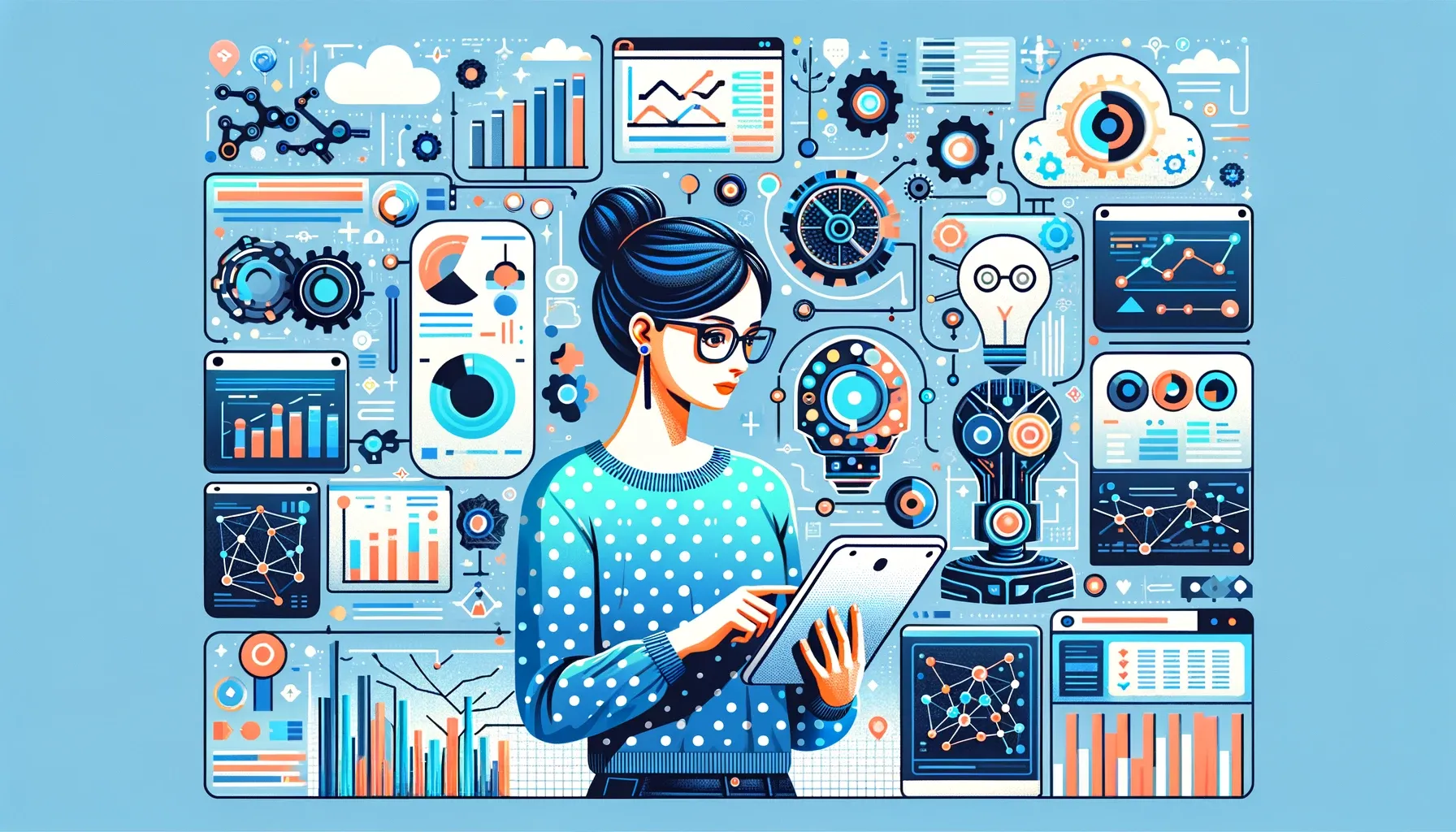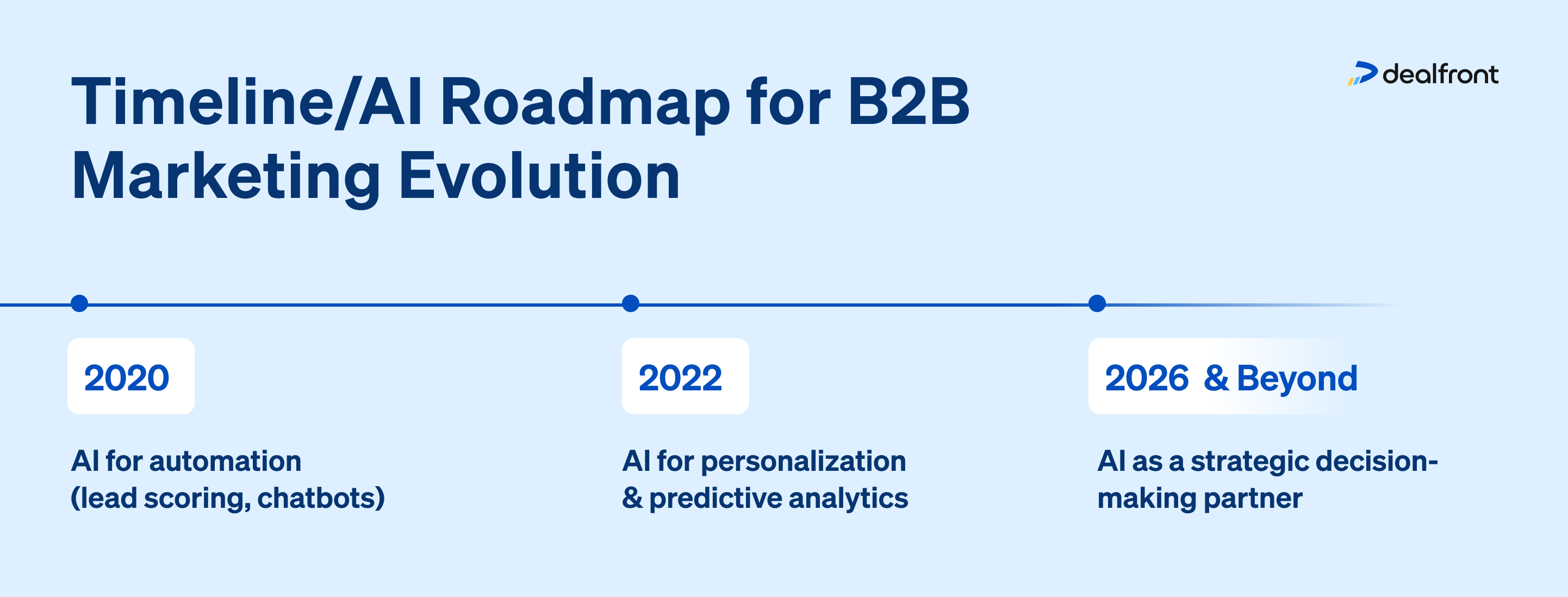The Future of B2B: Harnessing AI Automation to Drive Success
The landscape of B2B is changing as business increasingly transform to AI automation for tactical advantage. This makeover guarantees to enhance efficiency and client engagement through innovative innovations. Nevertheless, the integration of these devices is not without its challenges. Understanding exactly how businesses can browse this evolving surface will be necessary for future success. What elements will establish the efficiency of AI in this field? The responses might redefine conventional organization models.
Comprehending AI Automation in B2B
As businesses progressively look for efficiency, comprehending AI automation in B2B comes to be vital. AI automation describes using man-made knowledge technologies to enhance and enhance organization processes. In the B2B industry, this includes the assimilation of AI devices to take care of tasks such as information analysis, consumer interactions, and supply chain operations. By leveraging device understanding and natural language processing, business can enhance precision, lower human mistake, and speed up decision-making (B2B Growth Consulting). Moreover, AI automation facilitates the handling of big quantities of data, allowing services to extract important understandings and maximize their operations. As companies navigate this technological landscape, a complete grasp of AI automation's capabilities will equip them to remain affordable and receptive to market demands
Key Benefits of AI Automation for Companies
While lots of organizations face increasing operational demands, AI automation provides many advantages that can noticeably boost their efficiency. One substantial benefit is performance; AI systems can do recurring jobs much faster and with better precision than people, consequently freeing and reducing errors up staff members for even more critical campaigns. Furthermore, AI automation allows data-driven decision-making by examining large datasets rapidly, providing understandings that educate service methods. Expense reduction is another vital advantage, as automation reduces labor prices and maximizes resource allotment. Moreover, AI can boost scalability, permitting services to adapt to market adjustments promptly. Ultimately, the assimilation of AI automation promotes development, enabling business to remain affordable in a rapidly evolving landscape.
Changing Client Experiences With AI
AI is reshaping consumer experiences by boosting and allowing tailored interactions involvement. With the implementation of predictive analytics, businesses can expect customer needs and choices, resulting in extra tailored solutions. Additionally, enhancing assistance processes with AI innovation boosts efficiency and contentment, ultimately transforming the total consumer journey.
Customized Communications and Engagement
Customized communications have actually become a foundation of reliable customer engagement in the B2B landscape. By leveraging AI-driven options, organizations can tailor their communication and offerings to satisfy the special demands of each client. Automated systems evaluate client behaviors, preferences, and information, allowing companies to produce tailored experiences that reverberate with their target market. This degree of customization not just boosts client satisfaction but also fosters long-term loyalty. Additionally, AI tools help with real-time interactions, allowing companies to react quickly and effectively to queries and feedback. Consequently, firms can construct stronger relationships with clients, making sure that their solutions line up with advancing expectations. Inevitably, personalized interaction through AI causes improved results and continual success in the competitive B2B market.
Anticipating Analytics Application
As businesses progressively seek to boost customer experiences, implementing anticipating analytics has become a critical approach in the B2B market. By leveraging data-driven insights, companies can anticipate consumer needs and choices, enabling them to customize their offerings better. Predictive analytics makes use of historical information and sophisticated formulas to forecast future actions, allowing services to identify prospective obstacles and opportunities. This aggressive method not just enhances consumer satisfaction however additionally fosters commitment by supplying timely and appropriate options. In addition, predictive analytics assists in source appropriation, guaranteeing that advertising initiatives are focused on high-value prospects. Eventually, the assimilation of anticipating analytics equips B2B business with the tools needed to change customer interactions and drive long-term success in a progressively affordable landscape.
Enhancing Assistance Procedures
Enhancing consumer experiences in the B2B sector extends beyond predictive analytics; improving assistance processes plays a crucial duty. By incorporating AI-driven solutions, businesses can enhance and automate routine queries reaction times, causing increased client fulfillment. Chatbots and digital aides supply 24/7 support, dealing with client needs promptly and lowering the worry on human representatives. This automation permits groups to concentrate on complex issues, cultivating even more significant interactions. In addition, AI devices can examine assistance data to recognize fads and locations for renovation, making sure constant enhancement of service top quality. As organizations take on these innovations, they position themselves as receptive and customer-centric, eventually driving loyalty and organization development in an increasingly affordable landscape.
Enhancing Operations and Processes
Simplifying operations and procedures in B2B environments is essential for boosting overall performance. By enhancing workflow effectiveness and automating routine jobs, companies can lower hand-operated errors and maximize important sources. This shift not just improves efficiency but likewise makes it possible for teams to concentrate on tactical campaigns that drive growth.
Enhancing Workflow Effectiveness
Maximizing workflow effectiveness is essential for services looking for to enhance and lower operational costs efficiency. By assessing existing processes, companies can identify bottlenecks and redundancies that prevent efficiency. Implementing streamlined treatments boosts interaction and collaboration among groups, making certain that jobs are completed much more quickly. Making use of data-driven understandings enables companies to make educated decisions that fine-tune procedures even more. Furthermore, embracing integrated modern technologies can facilitate seamless information flow, reducing the danger of hold-ups and mistakes. As businesses accept these modifications, they not just promote a much more active workplace yet additionally place themselves to react rapidly to market demands - Growth Systems For B2B. Eventually, focusing on process effectiveness allows organizations to allocate resources effectively, driving lasting success in a progressively affordable landscape
Automating Routine Tasks
Many companies are significantly transforming to automation to manage routine tasks, identifying its possible to substantially enhance operational performance. By releasing AI-driven services, companies can streamline recurring tasks such as information access, invoice processing, and consumer queries. This shift not just minimizes human error yet likewise maximizes beneficial staff member time, enabling staff to concentrate on tactical initiatives and value-added jobs. Additionally, automation can boost response times and solution consistency, leading to improved customer contentment. As services browse an affordable landscape, leveraging automation for regular tasks comes to be important for maximizing workflows and keeping dexterity. Ultimately, this strategy fosters technology and drives growth, placing organizations for long-lasting success in the evolving B2B atmosphere.
Enhancing Decision-Making Via Data Insights

Overcoming Challenges in AI Application
AI application holds the assurance of substantial operational improvements, organizations commonly encounter a myriad of obstacles that can prevent progress. Key obstacles include data high quality concerns, as numerous business deal with irregular or insufficient datasets needed for efficient AI training. In addition, resistance to alter within the labor force can hamper the fostering of AI modern technologies, as staff members might be afraid task displacement or lack the required skills. Budget constraints also offer an obstacle, restricting investment in the needed infrastructure and talent. In addition, incorporating AI systems with existing procedures can be complex, requiring considerable time and resources. Getting over these difficulties requires a strategic approach that consists of complete training, modification management, and a commitment to constant improvement in AI campaigns.
Future Patterns: The Next Frontier in B2B Automation
While the landscape of B2B automation remains to progress, emerging fads are poised to redefine how companies operate. The assimilation of sophisticated artificial knowledge will promote a lot more customized consumer experiences, enabling businesses to customize solutions specifically to client demands. Furthermore, the surge of anticipating analytics will certainly enable companies to anticipate market shifts and maximize decision-making processes. Automation of routine tasks via robotic procedure automation (RPA) will certainly enhance performance, reducing functional prices considerably. Furthermore, the fostering of blockchain innovation promises boosted transparency and safety in purchases. As these innovations gain grip, firms will increasingly take advantage of AI-driven understandings to cultivate collaboration, enhance supply chains, and boost total performance, marking a transformative shift in the B2B landscape.
Often Asked Inquiries
What Sorts Of Businesses Can Benefit A Lot Of From AI Automation?
Production, logistics, and customer support businesses can benefit most from AI automation. These industries improve functional efficiency, minimize prices, and boost consumer communications, ultimately leading to enhanced efficiency and earnings in an open market.
Exactly How Can Small Companies Apply AI Automation Successfully?
Local business can apply AI automation properly by recognizing recurring jobs, picking easy to use devices, making sure appropriate training for workers, and slowly integrating remedies to maximize process while keeping an eye on efficiency and changing techniques based on comments.
What Are Typical False Impressions Concerning AI in B2B?
Typical misunderstandings about AI in B2B consist of the idea that it is only for huge business, that it ensures instant outcomes, and that it can fully change human decision-making instead of enhancing it. AI Automation For B2B.
Just How Does AI Automation Effect Employee Responsibilities and Job Security?
AI automation improves employee duties by enhancing repetitive jobs, promoting efficiency and technology. While some worry job loss, it commonly produces possibilities for upskilling and new placements, eventually boosting job security through included value and performance.
What Skills Are Required to Handle AI Automation Projects?

As companies significantly seek performance, understanding AI automation in B2B ends up being important. AI automation assists in the handling of large volumes of information, allowing businesses to draw out beneficial insights and optimize their operations. While several businesses grapple with increasing functional needs, AI automation presents various advantages that can markedly improve their efficiency. Automation of regular jobs through robotic procedure automation (RPA) will certainly boost efficiency, reducing functional prices considerably. Manufacturing, logistics, and client service companies can profit most from AI automation.